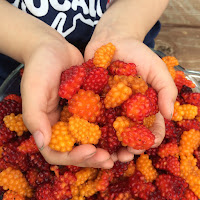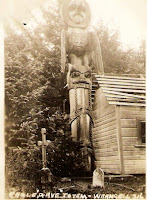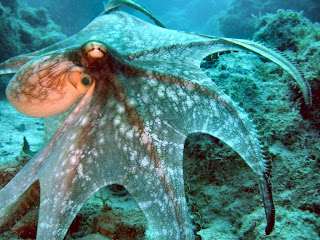The Underside of Leaves

I reach my arm out, moving the Indian Celery, and step into the salmonberry
bushes. Bright orange berries hang above my head. I close my eyes and see words: Orlando, Shooting, Gay. I reach to
pull the branches down but my arms feel weak. I let go and inhale. My body
aches in response to stress, especially my arms. I pluck a berry and drop it
into the bucket, making a hollow sound.
The dense
salmonberry thickets provide excellent escape habitats.
The morning’s sorrow, outrage,
and fear crammed my Facebook newsfeed. Due to anxiety, I don’t have T.V. and I
don’t watch news—even on Facebook—making navigating social media difficult.
Finally, I read one article. I sucked in my breath. Typically I write early,
but after I read the article, I couldn’t concentrate, so instead I put on my
hoodie and boots and headed out to pick berries.
Everyone get
out of Pulse and keep running.
Orlando is a long way from my salmonberry patch in Southeast Alaska. But
the hate is insidious and it is everywhere. I consider the hate it took to plan
and execute a massacre, how that hate is blind to the spectacular biodiversity
in all life. Biodiversity is interdependence and essential to our survival. I
hold the bright berry up to the sunlight. How can someone not see that? My
berry bucket fills until my chest tightens and I consider I’ve forgotten my blood
pressure meds, but then I realize it’s not that.—
The deadliest incident of violence against lesbian, gay,
bisexual, and transgender (LGBT) people in the history of the United States.
I pick a few more berries. A yellow tour bus has passed by on the small
highway beside the bushes where I’m hidden from view, its exhaust trails a
memory: I’m a 13 year old girl on the school bus and another girl, in the seat
in front of me, turns and says, “You kissed Audrey. Ewwww!” My face reddens. Murmurs rise and fall in the
half-filled bus. My arms collapse into my body, my schoolbook tumbles from my
hand. “She told me,” the girl added. I deny. Later, I stop seeing my kissing
friend. Instead, I spend time with other kissing girls, the secret ones who
don’t tell.
Salmonberry
flowers often appear before or with unfolding and expanding leaves.
Now, I reach for another berry and consider the natural order of
salmonberry plants, having both male and female identity, sharing the same plant body. On that
bus, long ago, I didn’t have a name for how I felt or who I was. Instead, I hid
and was ashamed. I had no one to talk to and I did not know how to look at
science and nature for answers.
Salmonberry
bushes are monoecious, possession both male and female reproductive organs on
the same plant and are capable of
reproducing both sexually
and asexually.
How can we recover from this, create our own healing possibilities? Life
layers itself, story upon story: a tragedy in Orlando, solace in the berry
bushes. Salmonberries’ asexual reproduction is considered layering. Basically,
the stem touches the soil and grows roots. Birds and insects, too, help with
salmonberry reproduction. There is something about layers, and making
connections, reaching out, that makes me consider how is it that we’re going to
restore our lives. It’ll take a community to accomplish that, I decide.
We are dealing with something we never imagined.
First, though, I must take care of myself. Take time out; or rather in the bushes. Traditional medicine
experts say you can chew up salmonberry leaves and spit them on burns. You can
even use the bark in the winter. Pound the bark to a pulp and place it on toothache
or wound for a painkiller. Boling bark in seawater as a medicine to lesson
labor pains, clean wounds, and burns. I could use good medicine. This country,
my town, could use good medicine.
The salmonberry
may also act as shelter and protection for various smaller animals.
I am alive. Many are dead. I can’t understand, and yet I can understand that, how this can be the
same day carrying both pain and beauty. I am soothed here picking berries,
while families across the U.S. are in anguish. My offerings to the universe of
solace and hope and despair and shame and joy are the same: They are the
berries dropped at my feet for the birds and mice.
If you’re
alive, raise your hand.
I raise my hands over my head; the bucket’s string is heavy on my neck with
the nearly full bucket. I consider the dancers and celebrators of love and life
at the Pulse nightclub, their families, and their friends. I wonder if anyone
on our island will organize a vigil for the shooting victims. Probably not.
The shooting
could have lasted a whole song.
I consider my friend Audrey’s boldness, how she wasn’t afraid, even back
then, to express love. She might’ve loved me. It’s likely that tonight, somewhere
she will be holding a candle, wax dripping, leaning against her partner’s shoulder.
What about the secret kissing girls? Are they reaching out for healing? What about me?
Vigils were held around the world.
My vigil began with the body-memory of berry picking, something I’ve done
every summer since I could walk. I lift the leaves beside me; there, in the
underside of leaves, half-dozen large red salmonberries bulge with sweetness.
Novice berry-pickers often glance at a bush and decide there aren’t many
berries so why bother picking. But I know how to look, how to lift the leaves. I
know these intimate leafy veins, the hairy underside, the thorny stalk, the
astringent smell, triggering memory after memory as I continue to pick.
As producer organisms, the salmonberry creates its own
energy.
Salmonberry bushes, if they’re damaged, can heal themselves, sending roots
out from the stems, burrowing into the soil in order to sprout other plants. They
keep going. They thrive. I reach for a big ripe salmonberry and instead of
putting it in my bucket, I put it in my mouth. It’s juicy and sweet. My
plant-body is grateful.
The fence has been decorated with vibrantly-colored
banners.
The first part of June is often called salmonberry days because this is the
time when harvesting begins. I plop another berry into my bucket. I pick
another and another. I think about the candle vigils in other cities and towns
that are likely to be planned. This is June and it’s Pride Month. The folks in
Juneau are participating in Pride month activities and I know there will be
nothing like that here. All I’ve done so far is to change my Facebook profile
photo to the pink, purple, and blue Bi colors and say nothing. I step carefully
through the bushes, heading deeper and deeper into them. The salmonberry is a riparian, meaning their roots
help prevent erosion. If salmonberry bushes near streams are cut down the dirt can
slough off into the stream. Our ecosystem’s biodiversity is enhanced by
thriving salmonberry plants; because removing them can cause invasive plant
species to take hold. I want to hold onto this; this feeling of plant-body
connectedness. I have to.
*
Restoration:
Salmonberry is a useful shrub in created wetlands because it transplants
easily, with good soil- binding qualities once it is established, and is well
adapted to eroded or disturbed sites.
In a bulldozed landscape, a small green tendril
emerges, lengthens; then another and another. A salmonberry bush begins to
grow. It only has two blossoms this year and is a couple feet tall. But next
year…
 A year after the Pulse Nightclub shooting in Orlando something
on our island changes. I use the terms “transforming” or “life-changing” and
some might even say “miracle” to describe what has happened to our island’s
LGBTQIA community since the summer of 2016. Someone organized a Southeast Alaska
LBTQIA group on Facebook, which morphed into a Wrangell specific group. Someone
moved to town and needed friends. Someone reached out to me. A root reached out
and embraced life.
A year after the Pulse Nightclub shooting in Orlando something
on our island changes. I use the terms “transforming” or “life-changing” and
some might even say “miracle” to describe what has happened to our island’s
LGBTQIA community since the summer of 2016. Someone organized a Southeast Alaska
LBTQIA group on Facebook, which morphed into a Wrangell specific group. Someone
moved to town and needed friends. Someone reached out to me. A root reached out
and embraced life.
Salmonberry
is strongly rhizomatous, so one needs to watch its growth carefully.
This past year, a handful of LGBTQA and allies in
Wrangell gathered and organized our island’s first Pride March, and then on
July 4th, we rode on the first Pride float my small community had ever seen. Rubus
spectabilis.
Pulse has
served as a place of love and acceptance.
There aren’t many salmonberries this year due to last winter’s lack of
snow, our late-coming spring, and torrential summer rains. Basically, we’ve had
a short, rainy growing season. I probably picked only two buckets of
salmonberries. But I’m patient; I have hope for next year’s season. I have hope
for our island community. We call ourselves Community
Roots, the first LGBTQA group of its kind in Wrangell. We are planning a TDOR (Transgender Day of Remembrance) vigil in the fall for all for all those who’ve died in the past year because of who they are. I
will be there with a candle. I will be there with my people.
To
mark themselves as "safe."
**Author Vivian Faith Prescott lives and writes at her Fishcamp in Wrangell, Alaska. She co-hosts Planet Alaska on Facebook.
*Previously published in Alaska Women Speak THANK YOU, EDITORS.
*Italics: Found lines from news articles
on Orlando shooting & Salmonberry, USDA Plant Guide.











Comments